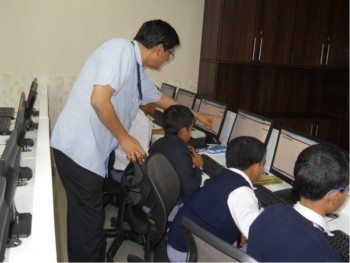A Jesuit Educator should be essentially an educationalist, a visionary and skilled integrator in bridging modern technology with traditional education platforms.
Dear friends,

As the Principal of St. Lawrence High School since 2014, in the beginning witnessing the mass exodus of students from our school to now pleasantly observing the inflow of students from other schools in short period of time is not a joke. What is our aim as a Jesuit Educator not to please people, but be faithful to one’s vocation and heading to the call. A Jesuit Educator should be essentially an educationalist, visionary and skilled integrator in bridging modern technology with traditional education platforms. Serving as the Vice Principal at St. Xavier’s Collegiate School for 6 years, one does gain experiences; that led me to be a staunch supporter of generating positive action among the youth in society. One’s mission and aim is to make learning a more joyful and interactive experience. A good leader is one that takes the lead, is efficient, and has personality, courage, dedication, and clear vision with ambition to succeed, of course, by the Grace of God. Good leadership encourages the team to perform to the optimum and drives organizational success. Last but not the least one has to be compassionate towards colleagues, staff and students who are the key stakeholders in an institution.
In view of the above it is worthwhile mentioning or sharing a few thoughts. Jesuit legacy, Jesuit pedagogy and Jesuit education system all over the world that focuses upon grooming the personality of each student becomes vital and integral. As a Principal and leader, one has to relentlessly emphasize and focus upon The Ignatian Pedagogical Paradigm and its three main elements of Experience, Reflection and Action. Somehow a Jesuit has to help one’s staff to internalize these values or else it is difficult.
Keeping in mind the changing scenario, magnitude and manifold prerequisites of the modern classroom, a Jesuit educator should strive hard to make learning an Interactive and Joyful Experience in the classroom. The goal and aim is to realize this ideology and transform this aim into a reality. This aim is being achieved at St. Lawrence where technology is gradually blending with traditional education platforms to bring out the best in our students. In brief the famous saying “Tell me and I’ll forget; show me and I may remember; involve me and I’ll understand” must be the motto of every Jesuit educator.
In this world of negativity the first task of Jesuit is inducing positive attitude in his staff and students thus gradually leading them to be torchbearers of progressive ‘Thought Process’. It is because of this Positive thinking that I could bring about a sea of change in the infrastructure and enhanced academic standards in St. Xavier’s Collegiate School (Then Vice-Principal from 2006-2012). Hence based on my previous experience, the same is continued with a great level of efficiency and dedication at St. Lawrence High School. With the support of the management could provide the staff and students state of the art facilities for teaching and learning.
Innovation in teaching and learning
The world is on flex. Same old rules and measures may not work all the time. Just as the world is on “work-in-progress-mode” so should a Jesuit educator constantly be educating himself, updating oneself and somehow materialize that in the staff and students. Most of my readings and research on education has been on the success stories of other countries in the world of education. My role model has been that of Finland paradigm. Thus St. Lawrence High School has got the touch of world-class aesthetics and infrastructure at present, involving both soft and hard skills.  As the Principal of St. Lawrence High School, I have embarked upon creating innovative platforms for teaching and learning that includes the School website, School Calendar app (in Android and IOS platforms), digital smart classrooms, ERP School Management Software, Auto generation of the Time Table (important factor to enable the teachers to learn new and innovative things their subjects every year) and Report Cards, Apple Labs for staff and students, Digital e-library, state of the art Staff room, lush green playgrounds for students to relax and study, and diverse e-learning platforms for the teachers and students.
As the Principal of St. Lawrence High School, I have embarked upon creating innovative platforms for teaching and learning that includes the School website, School Calendar app (in Android and IOS platforms), digital smart classrooms, ERP School Management Software, Auto generation of the Time Table (important factor to enable the teachers to learn new and innovative things their subjects every year) and Report Cards, Apple Labs for staff and students, Digital e-library, state of the art Staff room, lush green playgrounds for students to relax and study, and diverse e-learning platforms for the teachers and students.
To put it in perspective…if a student fails in math in primary school he continues to fail the same in the senior class too. And there is no way one can address this issue. The parents think tuition would suffice and the teachers sometime give up on the child. Thanks to the ERP now I am able to keep track of the students and their performance. One can easily do diagnostic test on students’ understanding and go back to the place where he has missed the point to understand the concept. Once the concept is clarified the subject becomes no more difficult to the students. Essentially the ERP allows teachers, parents and me to address the root cause of the problem of students rather than just only the symptoms.
Besides, based on students’ previous performance we begin the remedial class already from the beginning of the academic year. Often, one feels palpitation at the end of the year just before the exam…and that is too late. That is the reason we begin the remedial classes at the beginning of the year.
Often times, a Jesuit educator tries to put the best teachers in the senior classes namely 10, 11 and 12. But according to the Educational Psychologist this is wrong. By the time the students come to Class 10 they have already been either labelled or prejudiced about themselves as they cannot do certain subjects well. Changing this mindset at that time is relatively hard, very specially if a student is performing badly. The teacher too gives up easily on students. The actual scenario should be the best teachers must be employed in the lower and the middle school where the foundation is properly laid. A slight change in the plan of action got me three rank holders in the school. More than 80% of the students got 60% and above which is noteworthy.
Taking parents as important stakeholder is another feature. The more the parents interact with the teachers, Vice Principal and the Principal the better the students become. An example would do justice to the point raised. A student labelled as notorious, having disciplinary problem was brought to me. After talking to the student it became clear that certain issues needed the cooperation and constant vigilance of parents. When the parents of the boy were so desperate and hung their heads down, I just told them that it is not too late. I just asked them if they could come to the school once a week for the rest of the year without sighting any reason.
The condition is that they must meet the class teacher, subject-teachers and the vice principal. They boy must notice this. They agreed. By George, the Miracle happened. They boy took a U turn, and now he is writing class 10 exam. The boy understood that the parents are interested in him. He finally began to get attention! However, I am not saying all problems will be very simple and end so simply. But getting the parents to our side is the magic that will change students.
Technology in the classroom
 Present day technology helps us to let the parents know what we are doing with the children in the school. One can use these media to open the doors of the classrooms to parents at the tips of the finger. To bridge the gap between the parents and teachers we have made software applications through which the parents can know what is taught in the school, in terms lessons, homework and class work. Besides we have also taken upon the novel idea of putting up the model answers in parents’ domain so that the parents can guide their students in their daily lessons and after the exams. Until now the parents only get to know the question paper of the subjects. That may be half of the problem. By giving them the model answers many parents are able to guide their students back at home and thus the evil practice of tuition too is brought under control.
Present day technology helps us to let the parents know what we are doing with the children in the school. One can use these media to open the doors of the classrooms to parents at the tips of the finger. To bridge the gap between the parents and teachers we have made software applications through which the parents can know what is taught in the school, in terms lessons, homework and class work. Besides we have also taken upon the novel idea of putting up the model answers in parents’ domain so that the parents can guide their students in their daily lessons and after the exams. Until now the parents only get to know the question paper of the subjects. That may be half of the problem. By giving them the model answers many parents are able to guide their students back at home and thus the evil practice of tuition too is brought under control.
On any given day one can see in St. Lawrence, after the school gives over, so many parents sharing and talking to the teachers in the school about their sons. Slowly the fear and apprehension between the parents and teachers against one another is easing off. It is so nice to witness that. The outcome is being the winner school in many competitions as well as the Winner School for JEA’s St. Francis Xavier Global Instagram Competition initiated by the Education Delegates of JCAP.
Leadership in the Jesuit School
The Principal must be in touch with the students, very specially by taking classes. Often in the name of too much of administrative work many of us give up teaching. That is in my opinion suicidal. Once we are no more in touch with the pulse of the students’ life in the classroom, we begin to drift apart from students’ life. The very presence of the Principal in the school is for the welfare of the students. If the very concept is negated by his absence, what is the role of the principal then?
Good leadership is not only about authority and being in command. It has multi-faceted aspects namely Team Building, self-evaluation, Innovation, Equality, Motivation, Goal setting skills to achieve the impossible and understanding Human Relationships, which is fundamental in an institution. At St. Lawrence we never have a program without evaluation, after the example of St. Ignatius. Evaluation of every program as well as everyone involved, including the Principal, taking positive and negative feedback, helps looking at any program as the work of everyone. Here one is not isolated and found fault with but aim primarily how we can make this program better next time. Similarly, we never begin planning a program without the last year’s feedback of that program. Thus, sharing the responsibility of success and failure commonly is a great way of involving one and all.
 The greater the exposure, the better the dreams of students. Many a great world leaders began their humble journey by dreaming the impossible. To dream the impossible one has to be taken to the launching pad of EXPOSURE. Even though our school students are predominantly from lower and middle class as well as poor strata of society, some of them achieved great positions and posts at the national and international level. The key to their success is Motivation. To motivate the students further and enable them to discover their potential, we have provided the teachers and students with world class facilities namely apple research labs, an e-library, windows OS e-lab and an I-pad lab that transposes the students into a world of augmented reality…helping students comprehend the tough subjects easier and help them retain without rote memory. This enables students to understand theoretical and practical aspects in depth and empower teachers in the classroom with effective tools for teaching based on modern technology.
The greater the exposure, the better the dreams of students. Many a great world leaders began their humble journey by dreaming the impossible. To dream the impossible one has to be taken to the launching pad of EXPOSURE. Even though our school students are predominantly from lower and middle class as well as poor strata of society, some of them achieved great positions and posts at the national and international level. The key to their success is Motivation. To motivate the students further and enable them to discover their potential, we have provided the teachers and students with world class facilities namely apple research labs, an e-library, windows OS e-lab and an I-pad lab that transposes the students into a world of augmented reality…helping students comprehend the tough subjects easier and help them retain without rote memory. This enables students to understand theoretical and practical aspects in depth and empower teachers in the classroom with effective tools for teaching based on modern technology.
We are the citizens of the world. To bring the concept of “Vasudeva Kutumbakam” absorbed in the life of students, we have international students’ exchange program. Presently we are having an exchange program with a School in Kunming and Beijing in China. Every year, 10 students of our school after the completion of social work, go to China and live in Chinese family as their Son for ten days. During which time, he does everything like the Chines in the family. Similarly, 10 Chinese students live in our students’ home. They experience every aspect of culture and life of us and vice a versa. It is interesting to note a purely vegetarian Indian taking his Chinese ‘Son’ to a non-vegetarian hotel to make him comfortable! Exposure of this sort truly bring unity and brotherly love in the tender hearts of the students.
In nutshell, a Jesuit Educator must be agile and childlike in mind and heart always ready to learn and admire everybody and thing that comes on his way. In this world of negativity and for the souls laden with negativity may our schools be the beacon of Hope and the Good Tidings. To be so, the Leader of the Jesuit School must be Efficiently Compassionate.
This article was published in the Jesuit Educational Association (JEA) South Asia.
Se connecter ou Adhérer
pour créer et afficher des commentaires

